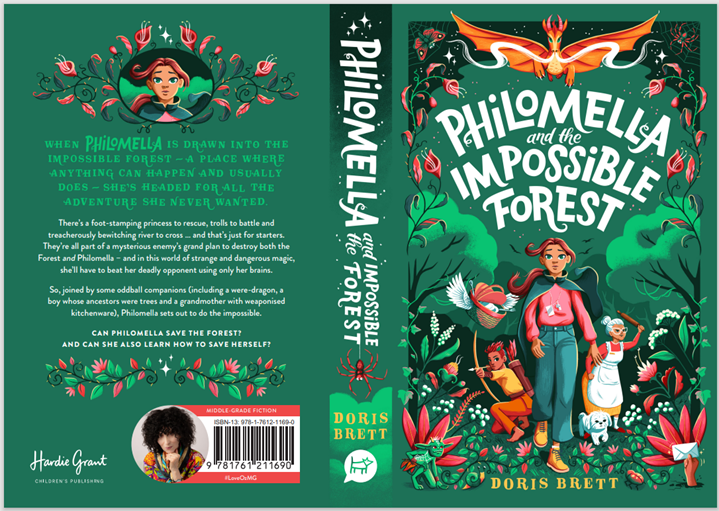
When author Doris Brett’s daughter Amantha was about to begin kindergarten, she started experiencing anxiety. No matter what Doris or her husband said to try and reassure their little girl, Amantha would not listen. So Doris started telling her stories about a little girl called Annie, who coincidentally happened to be heading to kindergarten and was feeling anxious about it. Suddenly Amantha was all ears, eager to hear how Annie coped and what strategies she used.
“What had been rejected when given as ‘advice’, was totally absorbed when given in the context of a story,” said Doris. “And in fact, Amantha went to kindergarten happily and used exactly the strategies that Annie had used successfully.”
Doris realised that while this was an age-old technique, no one had written about it and so her first book Annie Stories, published in 1988, went on to explain how to both create and use therapeutic stories to help children.
Doris explains: “Something that is too threatening for a child to think about directly, becomes much less threatening when it is experienced by a ‘proxy’ – a character in a story. It’s a wonderful way to communicate with children about difficult issues.”
Doris Brett went on to have a multi-faceted career path, not only continuing as an author but also specialising as a clinical psychologist. Her award-winning writing crosses genres, from memoir and poetry to psychology but it is only recently that she has published her debut novel for young readers, Philomella and the Impossible Forest.
Inspiration for Philomella
Doris read her way through classics such as The Lion, The Witch and The Wardrobe, and Harry Potter with her granddaughter. “Because it was a read-aloud experience, it was very easy to track when my granddaughter was fascinated and when she was losing interest,” Doris explains. “She also liked magic and adventure. We’d read a number of books and I was having trouble finding new ones that met the specifications, so I decided to write one myself, which was how Philomella and the Impossible Forest came about.”
“The other request [my granddaughter made] was that there be ‘danger’ in the story. When I asked her why she was so fond of danger in stories, she replied ‘Because I like to see how people get out of it.’” – Doris Brett
When writing, Doris knew that the book had to be page-turning, immersive and fun in order to engage a child’s interest: “Learning will only take place in a situation where the child’s attention is ‘hooked’. That was a priority for me when writing Philomella. Only when the reader is truly absorbed in the story, are they able to experience the challenges and problems encountered and – in concert with the hero – come to an emotional understanding, and ability to discover and create solutions. It is why novels are such beautiful vehicles for communication about the complex condition of being human.”

Using books to talk about big issues
When writing Philomella and the Impossible Forest, Doris knew who her protagonist would be: “an ordinary girl, who finds herself way outside her comfort zone and is forced to discover the resources within herself”. Beyond that, the story and characters were made up as she went along: “I didn’t know anything in advance – I was constantly discovering where events led, and what characters did as it happened.”
But just as all Doris’ writing has been inspired by her personal experience, Philomella’s story was subconsciously infused with years of learning about the human condition. “As a psychologist and a writer, I am always drawn to discovering how experience shapes people and their growth, and with the writing of Philomella, that expressed itself so naturally that I hadn’t even realised I was doing it,” she explains.
Some of the issues dealt with in Philomella include:
- managing anger and rejection
- facing your fears
- adjusting to unwanted change
- coping with failure
- learning resilience and independence
- the importance of looking beneath the surface,
- and the importance of kindness and empathy.
“Children often find it difficult to talk about emotional issues. They may be embarrassed or fear being misunderstood, ridiculed or judged. They may be protecting others, they may fear being seen as a snitch, or not believed. However, while uncomfortable talking about themselves, they are perfectly happy to discuss a story featuring a hero with similar issues. Talking about feelings, predicaments, and responses through the lens of a fictional protagonist becomes a non-threatening way of working through their own issues.” Doris Brett
Doris recommends using books like Philomella to initiate discussion about tough subjects by following four steps, starting by focussing on the characters to begin with.
Step 1: Discuss the book in the same way that a book club would, posing questions like ‘why did the character react in this way and not that way’ and ‘how do you think the hero felt?’
Step 2: The next step is to direct the questions posed by the book towards the real world, and ask students if they think people would really respond like that, or if they know anyone who might have reacted like that. “This is still far away enough from the child to be non-threatening”, she says.
Step 3: The next step is for the teacher or adult to bring themselves into the discussion. She explains: “Saying that you have felt something, makes it easier for the child to admit that they too have felt like that. They are more able to share their feelings because they sense that you will understand if you’ve ‘been there, done that’. This makes it less threatening for them.”
Step 4: the final step – when the child is ready – is to allow the child to talk about themselves. This step cannot be forced or rushed, Doris warns. “In the meantime, talking about emotions and issues through the means of a fictional character is extremely therapeutic and the insight a child gains is just as beneficial as if you were talking directly about the child. They will take that insight back with them, mull over it, and make it their own.”
Children also need heroes who model the values needed to thrive in the world. Unlike the digital realm where models and influencers lead seemingly effortless, perfect lives, Doris believes novels provide unlikely heroes, underdogs who struggle, fail, and then learn to pick themselves up. Books model the old-fashioned virtues of grit, determination and compassion.
“They also model hope. And this too is important for children,” she adds. “They need to believe that difficulties can be managed, that hard work is often necessary, but brings rewards, that redemption is possible and that failure can be valuable. For all of us, whatever the tunnel we find ourselves in, believing that there is a light at the end of it, gives us the motivation to go on.”
Philomella and the Impossible Forest by Doris Brett and published by Hardie Grant is available now.







